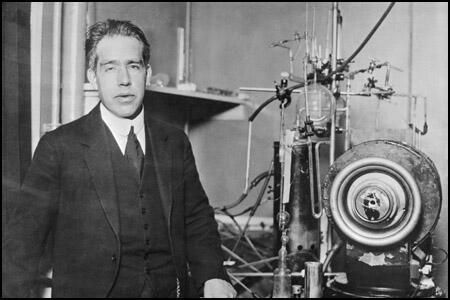Niels Bohr
Nils Bohr was born in Copenhagen, Denmark, on 7th October, 1885. The son of a physiology professor he got his PhD in physics from the University of Copenhagen in 1911.
Bohr worked with Ernest Rutherford in Manchester (1912-16) where he developed a model of atomic structure and helped to establish the validity of quantum theory.
In 1920 Bohr became director of the Institute of Theoretical Physics in Copenhagen. Several leading physicists went to work with Bohr including Edward Teller and Werner Heisenberg. In 1922 he won the Nobel Prize for physics.
Otto Frisch, a young scientist who fled from Nazi Germany worked closely with Bohr in Copenhagen. In 1938 Frisch introduced Bohr to Lise Meitner, a Jewish refugee from Germany. Meitner explained her theory of uranium fission and argued that by splitting the atom it was possible to use a few pounds of uranium to create the explosive and destructive power of many thousands of pounds of dynamite.
At a conference held in Washington in January, 1939, Bohr explained the possibility of creating nuclear weapons. After working with Enrico Fermi and Leo Szilard, Bohr showed that only the isotope uranium-235 would undergo fission with slow neutrons.

Bohr continued with his research after Denmark was invaded by the German Army. With the help of the British Secret Service he escaped to Sweden in 1943. He then moved on to the USA where he joined Robert Oppenheimer, Edward Teller, Enrico Fermi, David Bohm, James Franck, James Chadwick, Otto Frisch, Emilio Segre, Eugene Wigner, Felix Bloch, Leo Szilard and Klaus Fuchs on the Manhattan Project. Over the next two years Bohr helped develop the atom bombs dropped on Hiroshima and Nagasaki.
After the Second World War Bohr returned to Denmark where he argued for strict controls on the manufacture of nuclear weapons. Nils Bohr died in Copenhagen on 18th November, 1962.
Primary Sources
(1) Conversation between William Stephenson and President Franklin D. Roosevelt (February, 1943)
Roosevelt: "Could Bohr be whisked out from under Nazi noses and brought to the Manhattan Project?"
Stephenson: "It will have to be a British mission. Niels Bohr is a stubborn pacifist. He does not believe his work in Copenhagen will benefit the Germany military caste. Nor is he likely to join an American enterprise which has as its sole objective the construction of a bomb. But he is in constant touch with old colleagues in England whose integrity he respects."
(2) Niels Bohr, letter to President Franklin D. Roosevelt (3rd July, 1944)
A weapon of an unparalleled power is being created which will completely change all future conditions of warfare. Unless some agreement about the control of the use of the new active materials can be obtained in due time, any temporary advantage, however great, may be outweighed by a perpetual menace to human security. An initiative, aiming at forestalling a fateful competition, should serve to uproot any cause of distrust between the powers of whose harmonious collaboration the fate of coming generations will depend.

